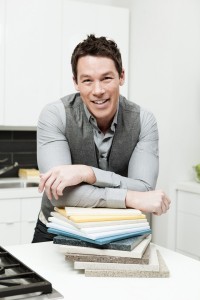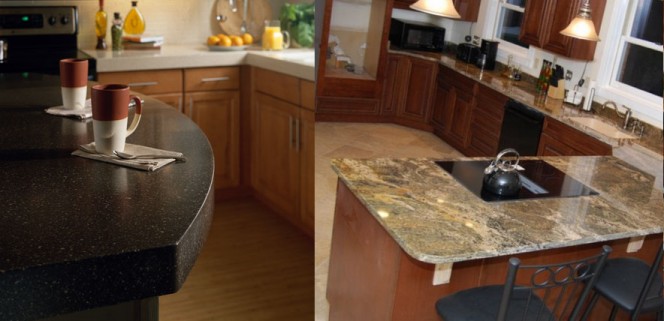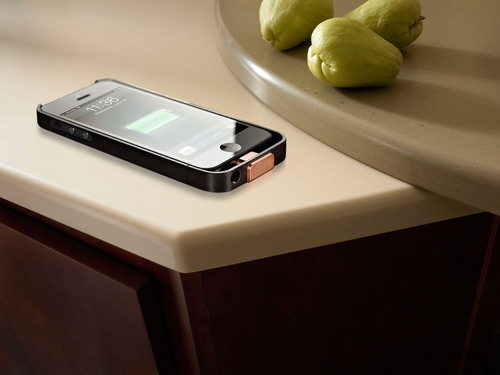
Designer and TV personality David Bromstad is now the creative consultant for DuPont Corian® and Zodiaq®.
DuPont Building Innovations Reveals Design Personalities with David Bromstad to Encourage the Use of More Expressive Color in Home Design
WILMINGTON, Del., Oct. 3, 2013 /PRNewswire/ — Energetic and animated designer and TV personality David Bromstad is dropping his paint brush for a moment to infuse color in interior design through the use of beautiful and dynamic DuPont™ Corian® solid surfaces and DuPont™ Zodiaq® quartz surfaces.
Bromstad has worked with DuPont to design a fun quiz that will determine which one of seven distinct design personalities match a homeowner’s style to help in their quest to create personalized, inspiring kitchens and bathrooms using DuPont™ Corian® and Zodiaq® surfaces.
“Homeowners typically have one chance to design their kitchens and bathrooms, which are among the most used spaces in a home,” said David Bromstad. “Our design tools help to make it easier and more rewarding by introducing homeowners to their design personality and giving them a color palette to work with.”
After answering a few simple questions through a visual quiz, users are introduced to one of seven design personalities that best resonates with their style. Design personalities include:
- The Collector: Every piece in her home tells a story. The Collector mixes textures from found objects with more classic styles for a palette based on rich browns and dark lichen. Light is brought in by sunshine yellow and soft greens.
- The Socialite: The Socialite knows confidence is her best accessory. She’s self-assured at home and at work – always leading by example. Lighter grays and warm tones of sand are balanced by rich, jet black to create a feeling of luxury and longevity.
- The Multi-tasker: The Multi-Tasker approaches life at full force – balancing and adjusting to the moment to meet it with exuberance. A family-friendly palette that is fresh, realistic, modern and classic – and infused with a much-needed jolt of coffee.
- The Entertainer: With an eye for modern sophistication, the Entertainer is comfortable no matter where he is – which is usually at the center of any situation. Graphic red and black contrast for a high-end feel, but are softened with warm taupe and golden yellow for a truly sophisticated theme.
- The Creator: The Creator loves anything quirky; what most people shy away from, he embraces. Mixed media, textures and inspirations make the color palette. From pairing water blues with coffee browns, this is experimentation at its bravest.
- The Naturalist: The Naturalist feels most at home in the great outdoors and strives to bring a sense of well-being into her home. Soft buttery browns complement light beige and cream tones while speckle textures commonly found in stone and granite inspire solid surfaces.
- The Traveler: The world is his inspiration. The Traveler mixes the best objects found in his travels – things that have an international significance to his life – to create a multi-cultural lifestyle. Anything exotic and unique is his normal; pottery clay, cobalt and indigo his color palette.
DuPont Building Innovations is a driving force in the transformation of the building and construction industry through its use of building and materials science to solve emerging needs and create value for its commercial and residential customers. The company maintains its industry-leading position by applying innovative thinking to the development of energy-saving weatherization systems and beautiful and long-lasting surfacing solutions. DuPont Building Innovations’ best-known products and premier brands include: DuPont™ Corian® solid surfaces, DuPont™ Zodiaq® quartz surfaces, DuPont™ Tyvek® Weatherization Systems and a broad portfolio of garden and landscaping products.
DuPont (NYSE: DD) has been bringing world-class science and engineering to the global marketplace in the form of innovative products, materials, and services since 1802. The company believes that by collaborating with customers, governments, NGOs, and thought leaders we can help find solutions to such global challenges as providing enough healthy food for people everywhere, decreasing dependence on fossil fuels, and protecting life and the environment. For additional information about DuPont and its commitment to inclusive innovation, please visit http://www.dupont.com.
Like Corian® on Facebook at Corian® Design and follow them on Twitter @coriandesign.
###
The DuPont Oval Logo, DuPont™, The miracles of science™, Tyvek®, Corian® and Zodiaq® are registered trademarks or trademarks of DuPont or its affiliates. Only DuPont makes Corian® and Zodiaq® surfaces.



